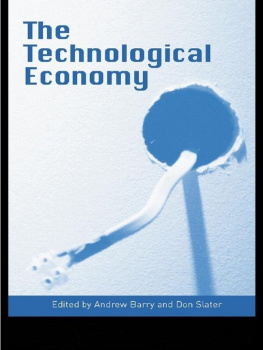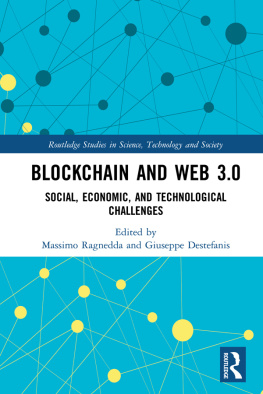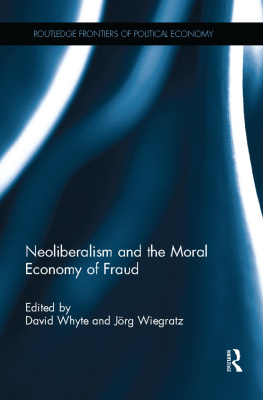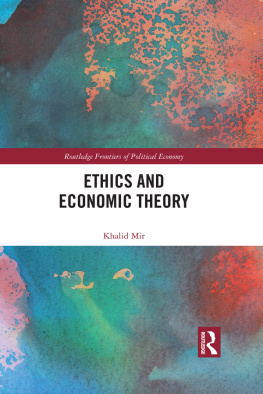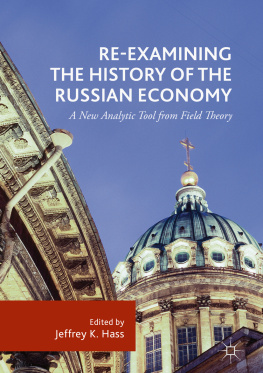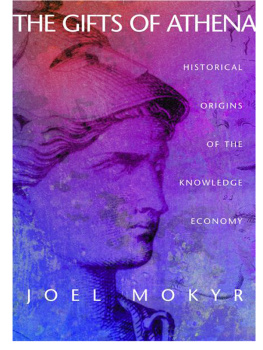The Technological Economy
In this major new collection, leading experts explore multidisciplinary connections between technology and economy, drawing on new convergences between economic sociology and science and technology studies. Through theoretical and empirical studies, the authors investigate economics and economic knowledges as technologies; economies as socio-technical assemblages; the nature of innovation; and the role of technological mediations in representing and performing economies. This book interrogates the evidence for contemporary claims about the emergence of the new economy and knowledge-based economy and sheds new light on the relation between economy and culture.
Andrew Barry is Senior Lecturer at Goldsmiths College, University of London and Don Slater is Reader in Sociology, London School of Economics.
Contributors: Michel Callon, Gordon L. Clark, Bob Jessop, Karin Knorr-Cetina, Celia Lury, Ccile Madel, Vololona Rabeharisoa, Marilyn Strathern, Nigel Thrift, Adam Tickell.
The Technological
Economy
Edited by
Andrew Barry and Don Slater
First published 2005
by Routledge
2 Park Square, Milton Park, Abingdon, Oxon OX14 4RN
Simultaneously published in the USA and Canada
by Routledge
270 Madison Ave, New York, NY 10016
Routledge is an imprint of the Taylor & Francis Group
This edition published in the Taylor & Francis e-Library, 2005.
"To purchase your own copy of this or any of Taylor & Francis or Routledge's collection of thousands of eBooks please go to www.eBookstore.tandf.co.uk.
2005 editorial matter and selection, Andrew Barry and Don Slater; individual chapters, the contributors
All rights reserved. No part of this book may be reprinted or reproduced or utilised in any form or by any electronic, mechanical, or other means, now known or hereafter invented, including photocopying and recording, or in any information storage or retrieval system, without permission in writing from the publishers.
British Library Cataloguing in Publication Data
A catalogue record for this book is available from the British Library
Library of Congress Cataloging in Publication Data
A catalog record for this book has been requested
ISBN 0-203-02245-9 Master e-book ISBN
ISBN 0-415-33605-8 (hbk)
ISBN 0-415-33606-6 (pbk)
eISBN: 978-1-13430-712-8
Contributors
Andrew Barry is Senior Lecturer in Sociology, Goldsmiths College, University of London. He is the author of Political Machines: Governing a Technological Society (Athlone 2001) and co-editor of Foucault and Political Reason: Liberalism, Neo-Liberalism and Rationalities of Government (UCL Press 1996).
Michel Callon is Professor at the cole des Mines de Paris. He is the author (with Pierre Lascoumes and Yanick Barthe) of Agir dans un monde incertain: essaisur la dmocratie technique (le Seuil 2001). He is currently finishing a study, with Vololona Rabeharisoa, of French patients organisations. His main areas of interest are the anthropology of markets and the study of technical democracy.
Gordon L. Clark is the Halford Mackinder Professor of Geography, Head of the School of Geography and the Environment, and is cross-affiliated with the Said Business School and the Institute of Ageing at the University of Oxford. An economic geographer, his research is at the intersection between global financial markets and national pension systems. Recent books include PensionFund Capitalism (Oxford University Press 2000) and European Pensions and GlobalFinance (Oxford University Press 2003). He is also the co-director of the Oxford-World Bank Conference on Global Pension Reform.
Bob Jessop is Professor of Sociology and Director of the Institute for Advanced Studies at Lancaster University. His most recent sole-authored book is The Futureof the Capitalist State (Polity 2002) and he is currently working on the contradictions of the knowledge-based economy.
Karin Knorr-Cetina is Professor of Sociology at the University of Konstanz, Visiting Professor at the University of Chicago and a member of the Institute of World-Society Studies, University of Bielefeld. She has published numerous papers and books including, Epistemic Cultures: How the Sciences Make Knowledge (Harvard University Press 1999).
Celia Lury is Professor of Sociology at Goldsmiths College, University of London.
Her most recent book is Brands: The Logos of the Global Economy (Routledge 2004).
Ccile Madel is researcher at the Centre de Sociologie de lInnovation, cole des Mines, Paris and the author (with Vololona Rabeharisoa) of Taste as a form of adjustment between food and consumers, in R. Coombs, K. Green, V. Walsh and A. Richards (eds) Demands, Markets, Users and Innovation (Edward Elgar 2001). Her current research interests include the relations between consumers and marketing professionals.
Vololona Rabeharisoa is Senior Lecturer in Sociology at the cole des Mines, Paris, and researcher at the Centre de Sociologie de lInnovation. She is working in the sociology of health and anthropology of markets. She is the author, in collaboration with Michel Callon, of Le pouvoir des maladies: lAssociation franaisecontre les myopathies et la recherche (Les Presses de lcole des Mines de Paris 1999).
Don Slater is Reader in Sociology at the London School of Economics. He is the author of Consumer Culture and Modernity (Polity 1997); Market Society (with Fran Tonkiss, Polity 2000), and The Internet: An Ethnographic Approach (with Daniel Miller, Berg 2000).
Marilyn Strathern is Professor of Social Anthropology at Cambridge University and Mistress of Girton College.
Nigel Thrift is Head of the Life and Environmental Sciences Division, Professor of Geography and a Student of Christ Church at the University of Oxford. His main research interests are in international finance, cities, information and communication technologies, non-representational theory and the history of time. Recent publications include Cities (with Ash Amin, Polity 2002) and KnowingCapitalism (Sage 2004).
Adam Tickell is Professor of Human Geography in the School of Geographical Sciences, University of Bristol.
Acknowledgements
Many of these papers were given in earlier forms at two workshops (on The Technological Economy held at Goldsmiths College and on Innovating Markets at the London School of Economics). Our thanks to all who participated in the events for their contributions, to the Departments of Sociology at Goldsmiths and the LSE, and to Economy and Society, for their financial support.
The following chapters have been published elsewhere, in whole or in part: Chapters in Economy and Society 31, 2, 2002; Chapter 6 in Distinktion 7, 723, 2003; Chapter 8 in Review of International Political Economy. Permission to publish this material is gratefully acknowledged.
Introduction
Andrew Barry and Don Slater
The technological economy is a pun whose multiple meanings reflect the complexity of new understandings of the economic. The many and diverse issues that connect technology and economy are indicated first by the increasing, and productive, convergences between science and technology studies on the one hand and economic sociology on the other. This intellectual agenda resonates with a wider range of relations between technology and economy that provide the stuff of contemporary attempts to understand the economic: economics as a technology; economies as material arrangements of technical devices; the nature of technological innovation and its role in socio-economic change; and models of contemporary society which draw on scientific and technological concepts, such as network and complexity.

